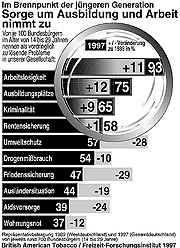Youth ’97: Concern about training and work on the rise
The "Brave New Leisure World" will not take place for the time being
More and more young people are having to learn the hard way: Free time is worth little without financial security. The triangle of demands - leisure, prosperity and more and more - is now also beginning to falter among the younger generation. And existential concerns about work or education are pushing other problems into the background. This is the result of the second extended edition of the study "Youth and Leisure", which has now been presented by the Leisure Research Institute of British American Tobacco. The current analysis was supplemented by representative comparative studies in which - as in 1989 and 1995 - almost 700 people under the age of 30 were also asked about their views on key socio-political issues.
From the perspective of the younger generation, the current ranking of urgent social problems to be solved is headed by the fight against unemployment and the creation of training places. Almost an entire generation is now calling for effective measures to combat unemployment, and the trend is clearly rising (1989: 82 % - 1995: 87 % - 1997: 93 %). And as never before in recent years, the young generation sees the creation of training places as an urgent problem to be solved. Three quarters of 14 to 29 year olds (75 %) in Germany are calling for measures in this area. Just a few years ago, the degree of urgency in this age group was rated much lower (1989: 63 % - 1995: 62 %). And even pension provision is now an urgent political task not only for 84 per cent of the over-50s, but already for 58 per cent of the under-30s.
On the other hand, problem areas that were previously ranked high by the youngest generation are increasingly falling out of favour. This applies in particular to environmental protection, which is currently only rated as urgent by 57 % of younger Germans (1989: 85 % - 1995: 69%). "Urgent problems of the present are inevitably pushed into the background as long as the existential security of the individual for the future does not seem assured," says Prof Dr Horst Opaschowski, Scientific Director of the Hamburg Institute. "And worries about work, education and income are increasingly overshadowing the dream of an enjoyable leisure life.
No future without work
When asked about their preferences for possible measures to reduce unemployment in Germany, the younger generation is not much different from the rest of the population. Even among the under-30s, there is a slight majority in favour of reducing overtime (53 % - total population: 50 %), lowering non-wage labour costs (50 % - total population: 50 %) and generally improving conditions for foreign companies to offset the migration of jobs (51 % - total population: 55 %). On the other hand, scepticism prevails when it comes to subsidising jobs for the unemployed (41 %), facilitating business start-ups (40 %) and solving problems by creating more part-time jobs (31 %) or promoting future technologies (29 %). And only a minority of eleven per cent (total population 12 %) expect a reduction in working hours with a simultaneous reduction in wages to provide an impetus in the fight against unemployment.



